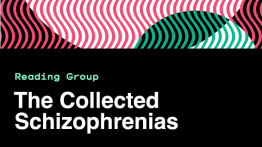Collected Schizophrenias Student Reading Group
Wednesday, February 23, 2022, 7 - 8pm
Wednesday, March 23, 2022, 7 - 8pm
Wednesday, April 20, 2022, 7 - 8pm
Wednesday, May 11, 2022, 7 - 8pm

Do you want to be part of a reading group focused on questions surrounding mental health?
We will be reading The Collected Schizophrenias by Esmé Weijun Wang. This group will meet once a month in 41 Cooper Square, room 104. Each month the group, guided by Fia Backström, assistant professor in the School of Art, will discuss different chapters as follows:
May 23, ch. 1-3
March 23, ch. 4-6
April 20, ch. 7-10
May 11, ch. 11-13
This group is open only to students, but we will explore a broader campus-wide reading group in the future.
Please sign up here to participate in the group and receive a FREE BOOK.
The Collected Schizophrenias centers on the author’s own struggles with mental health and chronic illness during her college years. The essays in the book tell stories on procedures of diagnosis, labeling, and manifestations of illness in daily life, ranging from using fashion to present as high functioning, to the failures of the higher education system, and the complexity of compounding factors such as PTSD. The book balances between personal narrative and research and dispels misconceptions around mental illness to provide insight into a misunderstood condition.




